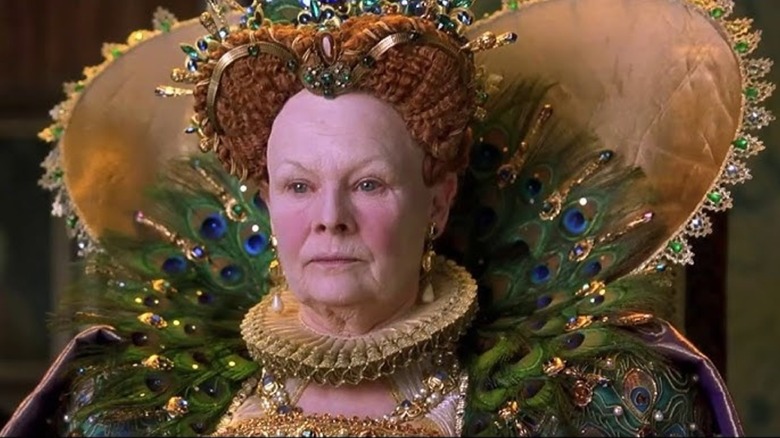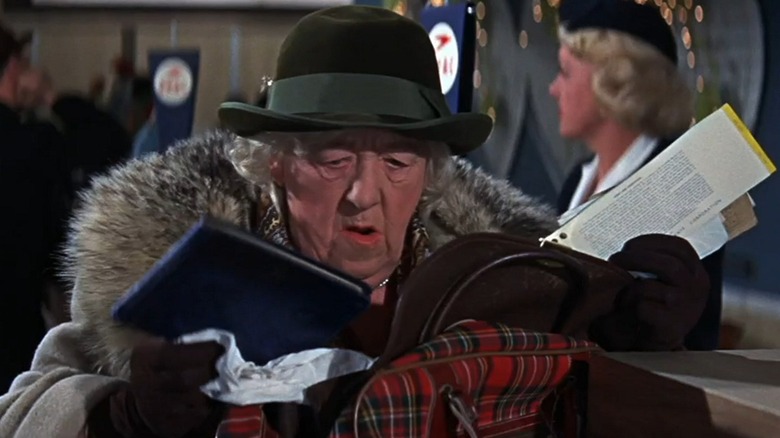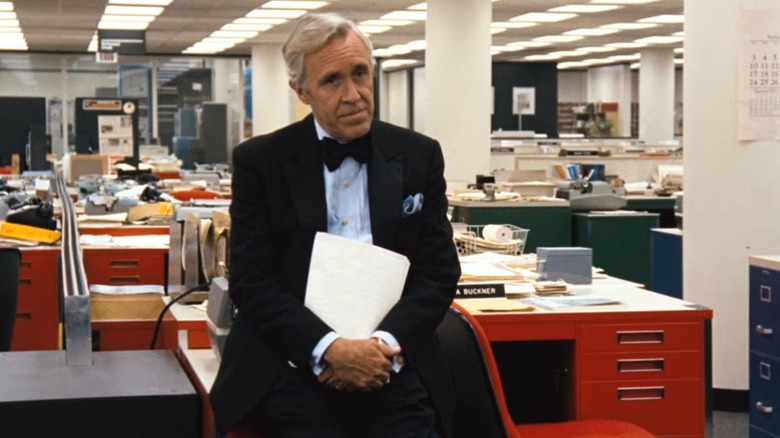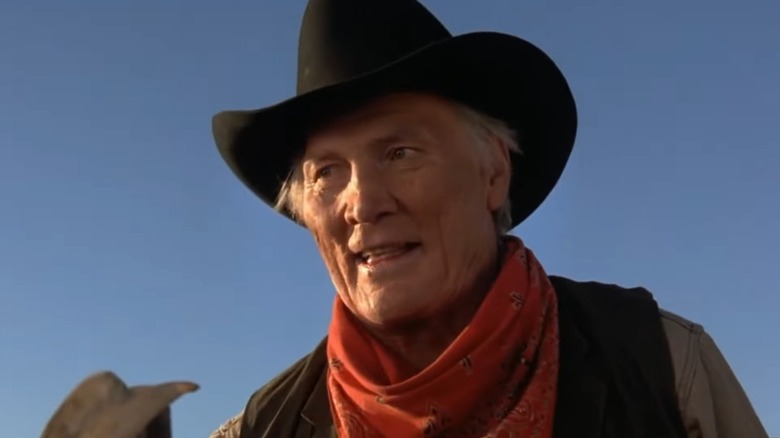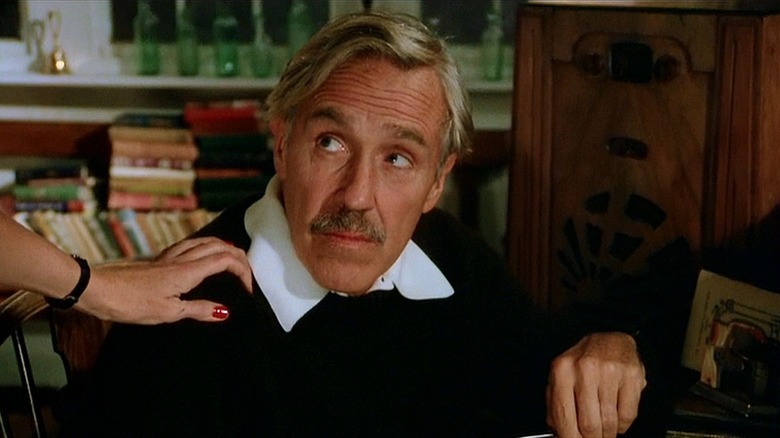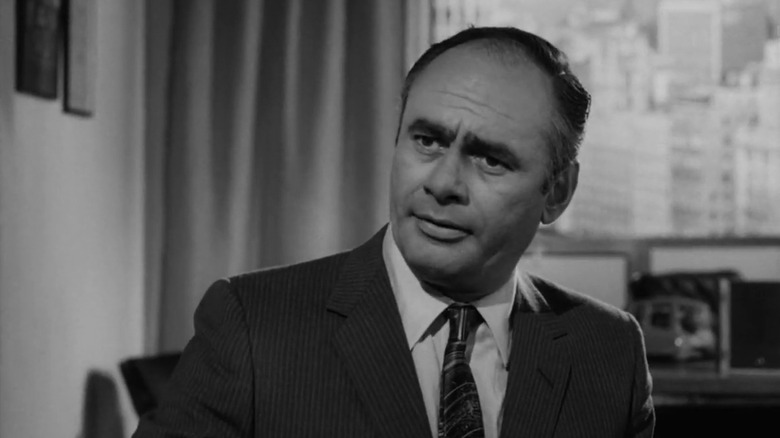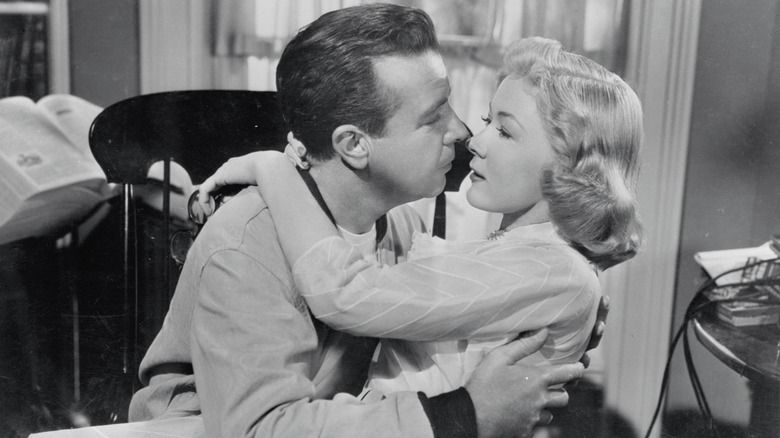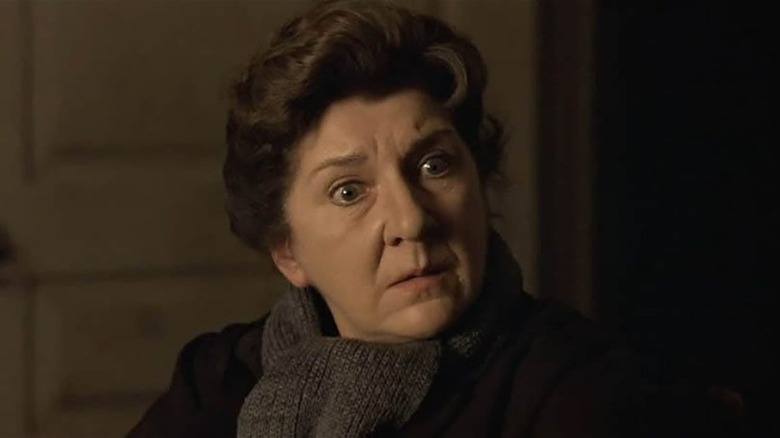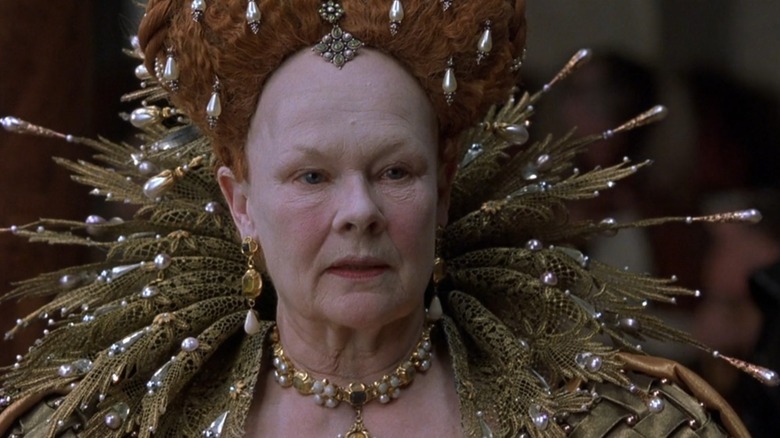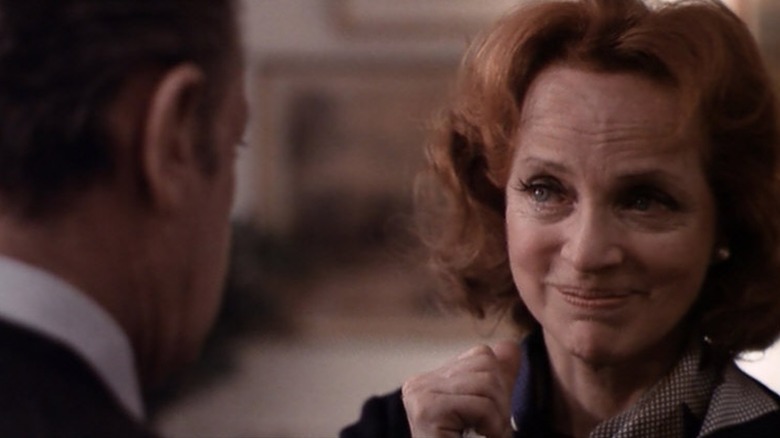10 Oscar-Winning Actors With The Shortest Amount Of Screentime
When most actors win an Academy Award, it's because they've crafted a fully-realized, nuanced portrayal of a character. They've created a person out of whole cloth, bringing them to life on screen in a way that no one else could've done in quite the same way. Understandably, a lot of Oscar-winning performances take the whole movie to do that. However, things get trickier when we move into the Best Supporting categories. Actors at this level are often working with a limited amount of scenes, trying to get a portrayal across in very small chunks that may not add up to anything close to the amount of time that audiences see their co-stars.
In "Conclave," for example, Isabella Rossellini plays Sister Agnes. She's one of the most senior nuns in Vatican City, and as such, she's given a position of power that winds up influencing the course of the Church's history. Though Sister Agnes is one of the film's most memorable characters — particularly for a scene involving a gasp-inducing curtsy — Rossellini only actually appears on screen for 7 minutes and 51 seconds. Nevertheless, the actor has picked up a considerable amount of Oscar buzz for her supporting turn.
If Rossellini were to win, that performance length would immediately put her in the Oscar history books. Still, it wouldn't actually be the shortest performance to take home the gold. Read on for a rundown of the ten Oscar-winning actors with the shortest amount of screentime.
Margaret Rutherford, The V.I.P.s. — Best Supporting Actress
The 1963 film "The V.I.P.s" is an aptly-named comedy about a group of very important people who find themselves stuck at an airport. It's aptly-named not just because the characters are all important, but because the actors, too, are all stars. Elizabeth Taylor, Richard Burton, Orson Welles, Rod Taylor, Maggie Smith, and more play the titular V.I.P.s, folks who get into all sorts of conflicts and shenanigans because of an interminable travel dilemma.
Margaret Rutherford, though, is the one who won the Oscar. She plays the Duchess of Brighton, a formerly rich lady who's headed to Florida for work in an effort to save her home. Even among such a stacked cast — and despite the fact that she's only on screen for 13 minutes and 6 seconds — Rutherford's performance stands out as one of the most memorable parts of the film.
She wasn't present at the Academy Awards ceremony that awarded her the statue, so her Oscar was accepted by Peter Ustinov in her stead. Cradling the award, he told the crowd, "May I, on behalf of a most distinguished, most deserving, and most funny friend, say thank you very much indeed."
Jason Robards, All The President's Men — Best Supporting Actor
"All The President's Men" is one of the best newsroom movies ever made. It's a thrilling account of Bob Woodward and Carl Bernstein's shocking exposé of the Watergate scandal, chronicling the efforts of the journalists to secure a story that would topple a presidency. Robert Redford and Dustin Hoffman — two of the best actors of their generation — play the legendary duo, and in their hands, the film is a superbly-acted drama about what it takes to put together an ironclad story that holds power to account.
Though Redford and Hoffman are great in the film, it's Jason Robards who took home the gold. He stars as Ben Bradlee, the Washington Post editor who wouldn't publish the Watergate story until it was as thoroughly-reported as it needed to be. Sure, he seems like a roadblock through much of the film, but it's ultimately Bradlee's encouragement — and acquiescence — that puts the story on the front page of the Post. Robards is excellent in the part, conveying Bradlee's journalistic standards in a way that makes you understand the reporters' frustration without rooting against the character. He's only on screen for 12 minutes and 58 seconds.
Robards held the statue by its head as he gave his acceptance speech. After shouting out Redford and more, he proclaimed, "In honor of ... Ben Bradlee for being alive so that he would let me come out and play with him, thank you very much."
Jack Palance, City Slickers — Best Supporting Actor
Jack Palance is one of the great character actors, and he had a face made for Westerns. In fact, he starred in "Shane," one of the best Westerns of all time, as Jack Wilson. Wilson's a gunfighter — one of the best — and he's hired by a cattle baron to intimidate the noble homesteaders who befriend the titular Shane. Palance was so great in the role that he was nominated for the Academy Award for Best Supporting Actor.
He wouldn't win, though, for several decades. In the 1991 comedy "City Slickers" — about three guys from the city who head out West to find themselves — Palance plays a cattle rancher named Curly Washburn. He's exactly the kind of character Palance used to play at the height of his career, a welcome face that lends legitimacy to the comedy's engagement with the Western genre. Perhaps in part because the role reminded everyone of what a great career he had — and even though he's only on screen for 12 minutes and 24 seconds — Palance won the Oscar for Best Supporting Actor.
His acceptance speech is one of the best. Though he was in his seventies, the actor did several pushups on stage just to prove he could. He also recalled an experience shooting his first movie back in 1949. "The producer came to me and he said ... 'Jack, you're going to win the Academy Award.' Can you believe it?" Palance marveled. "Forty-two years later he was right."
Jason Robards, Julia — Best Supporting Actor
"All The President's Men" wasn't the only time Jason Robards won an Oscar with a considerably small amount of screen time. He also took home an award for his role in "Julia," a 1977 drama about a writer in Europe who gets involved in the anti-Nazi movement in the years leading up to World War II. Robards plays Dashiell Hammett, the real-life author behind classic works of detective fiction such as "The Thin Man" and "The Maltese Falcon." He's the lover of Lillian Hellman (Jane Fonda), the writer who reconnects with a childhood friend named Julia (Vanessa Redgrave) before being drawn into clandestine smuggling efforts.
The film got a lot of Oscar love, picking up nominations for all three of the principal actors. Fonda went home empty-handed, but Redgrave and Robards both won, even though Robards is only on screen for 10 minutes and 49 seconds. As in "All The President's Men," he's an actor who can do quite a lot with very little; his Hammett is a calming presence in a life increasingly spinning out of control.
Interestingly, Robards is one of only a few actors to net back-to-back wins at the Academy Awards. "All The President's Men" was released in 1976, and "Julia" came out the following year. Perhaps that's why Robards didn't bother attending the ceremony a second time.
Martin Balsam, A Thousand Clowns — Best Supporting Actor
Martin Balsam is perhaps best known as Arbogast, the detective in "Psycho" who gets pushed down the stairs. It's one of the Alfred Hitchcock film's most daring stunts, the camera following Arbogast down as his arms windmill in panic and terror. It's as if we're Norman Bates (Anthony Perkins), the camera becoming the instrument of Arbogast's destruction; for the sequence to work, it requires an actor like Balsam who can communicate the utter horror of the moment.
Did you know that Balsam is also an Oscar-winner? Five years after "Psycho," he picked up gold for his role in the 1965 film "A Thousand Clowns." It's a supporting part, only adding up to a bit more than ten minutes of screen time, but Balsam gets to be funny and furious in equal measure. The movie is about Martin, a comedy writer (Jason Robards in a leading role!) who is embattled in a custody situation, forced to shape up to make sure he doesn't lose his nephew. Balsam plays Arnold, the writer's agent, and he shows up at several key points to give Martin some important guidance.
As a performer who spent much of his career in thankless, small roles, Balsam was overwhelmed when his name was announced as the Best Supporting Actor winner. "I've just seen all those movies; I don't know what to say now," he said in his acceptance speech. "I'm elated. I'm delighted. I'm stunned."
Ben Johnson, The Last Picture Show — Best Supporting Actor
"The Last Picture Show" is not only the best Jeff Bridges film; it's one of the best films of all time. The 1971 drama is about kids growing up in Texas in the 1950s, reckoning with the fact that their small town is rapidly becoming a thing of the past. Anarene, Texas stands in for the West itself, and "The Last Picture Show" is a film about the end of an era, about restless youth who realize that they need to make their own way to survive a way of life that's fading away.
The film's thematics are embodied best in the character of Sam the Lion (Ben Johnson), a hardened older man who's watched his town come and go. One day by the lake, he delivers a monologue to the youngsters that waxes poetic about the ways of his youth, telling a story about a wild romance with a woman who used to swim without her bathing suit. "I reckon the reason why I always drag you out here is probably I'm just as sentimental as the next feller when it comes to old times," he muses.
Johnson's delivery is so stirring that it won him the Oscar, even though he only appears in the film for 9 minutes and 54 seconds. Accepting the award, Johnson joked, "This couldn't have happened to a nicer feller."
Gloria Grahame, The Bad and the Beautiful — Best Supporting Actress
Hollywood loves to make movies about Hollywood, and one of the best of the bunch is the 1951 Vicente Minnelli melodrama "The Bad and the Beautiful." It's so good, in fact, that it made the list of classic films that Steven Spielberg made for TCM. "The Bad and the Beautiful" isn't just the template for titles that sound like that; it's also a gorgeously-photographed, well-acted film about the types of people who work in Tinseltown. It's about a director named Jonathan Shields (Kirk Douglas), a successful filmmaker who has nevertheless angered a number of well-respected people in the industry. In a series of flashbacks, "The Bad and the Beautiful" untangles his conflicts with actors, producers, and other directors with whom he's run afoul.
Gloria Grahame plays Rosemary Bartlow, the starry-eyed wife of a writer whose book is optioned by Shields. To get her out of the way and to make sure she stops meddling in the film's production, Shields hires someone to seduce her into an affair. It's a pivotal role, but Grahame is only on screen for 9 minutes and 32 seconds. Nevertheless, Grahame makes enough of an impression that she walked away with the Academy Award for Best Supporting Actress.
Befitting of her tiny part in "The Bad and The Beautiful," Grahame also gave one of the shortest acceptance speeches of all time. She collected her award, stood on stage, and said simply, "Thank you very much."
Maureen Stapleton, Reds — Best Supporting Actress
In 1981, Warren Beatty co-wrote, directed, and starred in "Reds," an epic film about a journalist named John Reed. The film follows his life over many years and across continents as he tracks the rise of communism, ultimately witnessing and writing about the 1917 October Revolution in Russia. Along the way, he comes into contact with a number of influential revolutionary figures, many of whom are played by great character actors like Paul Sorvino and Edward Herrmann.
The film picked up several Academy Awards, including Best Director for Beatty and Best Cinematography. Maureen Stapleton also won, taking home Best Supporting Actress for her role as anarchist Emma Goldman. She's only on screen for 9 minutes and 15 seconds, but that's more than enough to make an impact; Emma has several key appearances throughout the film, giving Reed insight into the burgeoning communist movement in a way that's impossible to ignore.
In her acceptance speech, Stapleton credited movie star Joel Mcrea for being her biggest inspiration. She also made sure to shout out her fellow nominees, telling the audience, "Thank you. Thank you. I'm thrilled, happy, delighted ... sober. I am very happy to win. I was happy to be with my co-nominees. The pleasure of their company was lovely."
Judi Dench, Shakespeare in Love — Best Supporting Actress
If you're a female British actor of a certain age, it's almost inevitable that you'll be asked to play a queen. In Judi Dench's case, she's been Queen Victoria twice, having portrayed the same royal in both "Victoria & Abdul" and "Mrs. Brown." In the 1997 film "Shakespeare in Love," however, she played Elizabeth I. It's a small part, clocking in a bit over eight minutes, but it was enough to win her the Oscar for Best Supporting Actress.
"Shakespeare in Love" takes many liberties with William Shakespeare's life. In the film, which chronicles the time around when he was writing "Romeo & Juliet," he's played by Joseph Fiennes; the movie imagines him falling in love with a woman named Viola (Gwyneth Paltrow). Queen Elizabeth I gets briefly involved in a bet, encouraging The Bard to write a play that captures true love's nature. The resulting play is his classic tale of star-crossed lovers.
When Dench won the Oscar, she acknowledged her limited screen time in her acceptance speech. "I feel for eight minutes on the screen I should only get a little bit of him. I do thank the Academy very much indeed," she said. "I do think also that the best bit about the Academy Awards is being nominated. You live in a kind of haze for several weeks, and the terrible thing is that somebody's got to win. My heart goes out to all the other four who didn't."
Beatrice Straight, Network — Best Supporting Actress
Sidney Lumet's "Network" is a film with a behind-the-scenes story that's almost as dramatic as the film. Faye Dunaway was nearly fired from the production, for one; as the scheming television producer Diana Christensen, she was given some of the film's meatiest monologues. She had a hard time wrapping her mouth around the film's rapid-fire dialogue, and Lumet almost cut her from the film. Ultimately, she delivered an excellent performance that's up there with her best.
Dunaway isn't the only actor who was given difficult material; after all, Peter Finch's rage-filled howl of "I'm mad as hell, and I'm not gonna take it anymore!" is one of cinema's most iconic lines. Dunaway and Finch won Best Actress and Best Actor for their roles in "Network," but they're not the only actors to be recognized for the film with some Oscar gold. They were joined by Beatrice Straight, who plays Louise Schumacher. She's only in the film for 5 minutes and 2 seconds, but her monologue upon learning of her husband's infidelity is so stunning, so passionately-delivered, so unforgettable, that they decided to award her anyway.
"I'm the dark horse," Straight acknowledged at the top of her acceptance speech. "And thank you so much, all of you. It's a great, great thrill for me and very unexpected." She went on to add, "It's a great profession and we have to keep thinking it all the time. And we all do. And we all love it."
